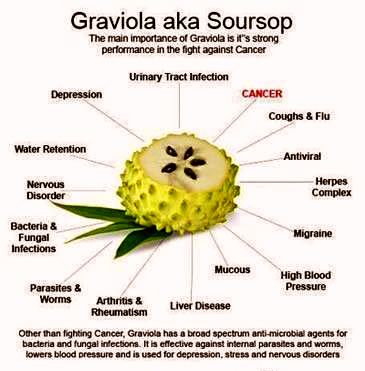| Medicinal Properties of Lakshman Phal |
|
Soursop scientific name is annona muricata. Soursop tree is a evergreen tree that is a native of Brazil & is also available in Venezuela, central America, Peru, Columbia, Mexico and Cuba. Its called by various names in Hindi, English, Tamil, Telgu, Marathi, Kannada, Malyalam, Urdu, bengali, etc which mean Hanuman Phal or Laxman Phal. It is not to be confused with Ram Phal which is entirely different inspite of being from the same family. This tree is grown in the rainforest of amazon and it is a gift of miracle for patients of cancer. Graviola / Soursop fruit juice can be consumed daily for its anti-oxidant effects & high nutrition value. Its been clinically proved to help Cancer, Aids, TB & other immuno compromised patients. It helps to increase Appetite, Immunity & side effects of allopathic medications like burning sensation, nausea, generalized weakness, etc. Dosage: 15ml twice a day. It can be taken along with water or other juices also. Time of Intake: Empty Stomach in morning & evening. Storage: It can be stored in cool & dry place. Since it is stabilized naturally so no need to refrigerate. By whatever name, this tropical evergreen tree produces a fruit with white flesh, many large seeds and an extremely sweet, slightly acidic flavor. Because it is difficult to eat, its pulp is commonly made into juice. Not only the fruit but also other parts of this plant — the leaves, stem, bark, roots, and seeds — have a long history of medicinal use in the Americas. Graviola is used as a natural remedy for infections, fever, digestive problems and high blood pressure [source: Cassileth]. Researchers have documented many other traditional uses among the indigenous people of the Andes, the Amazon and the Caribbean. Recently, scientists have begun to explore the potential of the bioactive chemicals in graviola leaves, stems and seeds, called annonaceous acetogenins. These acetogenins appear to have powerful anti-tumor and anti-cancer qualities. Some test-tube studies have concluded that graviola compounds may be able to target and kill cancer cells, even drug-resistant ones, without interfering with healthy cells. Additional utilization of graviola has been documented within specific native healing traditions. In the Andean mountain ranges of Peru, graviola leaves are brewed to discharge mucus and soothe inflamed mucous membranes. To the east, in the Amazon region, the bark, leaves and roots are used by diabetics to stabilize blood sugar. The leaf tea is taken as a heart tonic in Guyana, a liver remedy in Brazil, and a treatment for asthma, coughs and flu in the West Indies. It is also used for arthritis and rheumatism, and some mothers eat and drink the graviola fruit to increase lactation [source: Taylor]. New York’s Memorial Sloan-Kettering Cancer Center affirms a number of the plant’s beneficial properties, including antiviral, antiparasitic, antirheumatic and emetic effects on its Web site [source: Memorial Sloan-Kettering]. In view of this extensive list of benefits, the claims for graviola’s cytotoxic effects on tumors and cancer cells have acquired a certain credibility for many people, despite the absence of scientific evidence on human subjects. |



